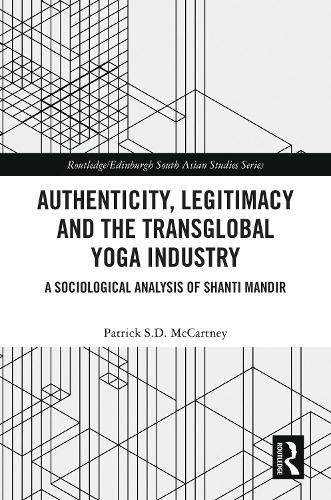Readings Newsletter
Become a Readings Member to make your shopping experience even easier.
Sign in or sign up for free!
You’re not far away from qualifying for FREE standard shipping within Australia
You’ve qualified for FREE standard shipping within Australia
The cart is loading…






This book is a sociological study of knowledge and knowers and explores the production and perceived value of 'yogic knowledge,' how distinction is curated, and how access to this knowledge is gained.
The book focuses on the organization Shanti Mandir (SM) in India, a new religious movement, which was founded in 1987 by Swami Nityananda Saraswati. It is a non-profit charity operating within the unregulated and competitive multi-billion dollar global and domestic wellness/spiritual tourism industries, and as a registered education provider within India's education industry. The main aim of this book is to answer the question how legitimacy is acquired, negotiated and expressed within the SM yoga ashram. The theoretical framework applied in this study is a confluence of the sociology of education, knowledge and religion. The author engages a methodology based primarily on ethnographic participant-observation and discourse analysis. Situating SM within the transglobal yoga and spiritual tourism industries, the book demonstrates how SM promotes itself as a provider of a consumable lifestyle that spiritual aspirants can adopt through attending retreats, workshops, meditation intensives, yoga teacher training and philosophy courses in their global network of ashrams. By identifying the structuring forces of the guru's discourse, and focusing on the marketing strategies and subsequent exchanges of capital and affective emotions, this monograph documents what the legitimate yogic identity promoted by SM is within the context of the transglobal yoga industry.
A highly original and incisive portrait of an Indian devotional community with strong transnational connections, this book will be of interest to researchers studying South Asian Studies, Religious Studies, Indian religion and yoga.
$9.00 standard shipping within Australia
FREE standard shipping within Australia for orders over $100.00
Express & International shipping calculated at checkout
This book is a sociological study of knowledge and knowers and explores the production and perceived value of 'yogic knowledge,' how distinction is curated, and how access to this knowledge is gained.
The book focuses on the organization Shanti Mandir (SM) in India, a new religious movement, which was founded in 1987 by Swami Nityananda Saraswati. It is a non-profit charity operating within the unregulated and competitive multi-billion dollar global and domestic wellness/spiritual tourism industries, and as a registered education provider within India's education industry. The main aim of this book is to answer the question how legitimacy is acquired, negotiated and expressed within the SM yoga ashram. The theoretical framework applied in this study is a confluence of the sociology of education, knowledge and religion. The author engages a methodology based primarily on ethnographic participant-observation and discourse analysis. Situating SM within the transglobal yoga and spiritual tourism industries, the book demonstrates how SM promotes itself as a provider of a consumable lifestyle that spiritual aspirants can adopt through attending retreats, workshops, meditation intensives, yoga teacher training and philosophy courses in their global network of ashrams. By identifying the structuring forces of the guru's discourse, and focusing on the marketing strategies and subsequent exchanges of capital and affective emotions, this monograph documents what the legitimate yogic identity promoted by SM is within the context of the transglobal yoga industry.
A highly original and incisive portrait of an Indian devotional community with strong transnational connections, this book will be of interest to researchers studying South Asian Studies, Religious Studies, Indian religion and yoga.